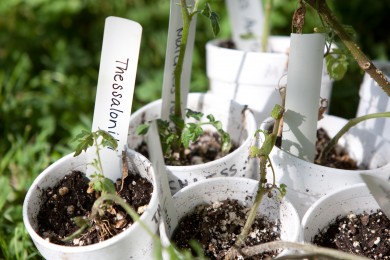Focus on food in the forest
Justice. Politics. Access. Quality. Insecurity. Production. Deserts. Sustainability.
One word that connects all of these words is FOOD. At Wake Forest, references to these terms – food justice, food quality, food politics – can be found everywhere, woven into the fabric of students’ lives through their course work, extra-curricular activities and service learning opportunities.
This semester’s “Make Every Bite Count” speaker series has kept the focus on food by investigating farming and the foods we eat: who grows them, how they are grown, and what challenges and opportunities this holds for local, regional, and global food supplies.
The series has turned out to be an educational boon for chemistry professor Angela King, who is one of many faculty members across campus who weave food and sustainability issues into their curriculum. She is teaching a class, “True Value Meals,” which explores the complex interactions among advertising, food production, safety and availability, agricultural environmental impact and standards of living.
“I just hit the jackpot in terms of scheduling,” King said of the series. “It goes great with the content of my course, and it’s been a nice supplement.”
One of the most important aspects of the class, she said, is the 18 hours of food-related service learning that is required of students.
“My goal was to expand their experiences to enrich class discussion. Most of our students don’t know much about agriculture coming in … most of our students have not experienced food insecurity,” she said.
This requirement leads most of her students to work with three campus service groups that focus on food: Campus Kitchen, Campus Garden and Wake Saturdays. Students find that volunteering becomes a habit and they continue because they love it, King said. “It has gone beyond what I expected,” she said.
For sophomore John McCarren, the requirement led him to the Campus Garden. “The instructors and workers there are extremely knowledgeable and have a passion for growing food sustainably, which has inspired and attracted me to go there more,” he said.
As a student-athlete who plays baseball, McCarren said the class has taught him to be a smarter consumer and know where his food is coming from. “True Value Meals has really opened my eyes to how many issues and debates there are regarding food in the United States,” he said. “Before this class I never really thought about where my food was coming from; however, I am now educated to think about the long-term process of my meal and where it was derived from.”
King has also required students to attend the Make Every Bite Count series events unless they had a class or scholarship conflict. They’ve gone as a group and then used the next class as a time to discuss what they learned.
The three-event series culminated Nov. 4 with speaker Vandana Shiva, author of “Staying Alive: Women, Ecology and Development” and founder of Navdanya, a national movement to protect the diversity and integrity of living resources – especially native seed – and to promote organic farming and fair trade. Being able to use speaker events like Shiva to highlight curriculum has been helpful to her class, King said.
Freshman Annie Mampieri went to hear Shiva speak and found her “incredibly compelling.” Shiva gave an overview of native seeds and the challenges of feeding the world before taking questions from the audience.
“I really enjoyed the question and answer session because it made her points seem realistic and logical,” Mampieri said. “She explained how our community could benefit from diversity and local farming. Her commitment to sustainability captivated me in a way that made me want to follow exactly what she was saying. I thoroughly enjoyed her talk.”
The final lecture was co-sponsored by the Office of Sustainability; School of Divinity’s Food, Faith, and Religious Leadership Initiative; the Center for Energy, Environment, and Sustainability; department of biology; department of chemistry; Pro Humanitate Institute; and Women’s, Gender, and Sexuality Studies.
Over many years, there has been a focus on food-related issues and it continues to grow. Provost Rogan Kersh (’86) might have stated it best in a topical guest column in Wake Forest Magazine’s Summer ’14 edition that focused on food matters. He called the university’s attention to food “in keeping with our institutional DNA.”
Categories: Campus Life, Environment & Sustainability, Experiential Learning, Happening at Wake, Research & Discovery, University Announcements
Media Contact
Wake Forest News
media@wfu.edu
336.758.5237



